Last Updated on October 10, 2022
Every car engine has a combustion chamber, and this chamber requires air to generate adequate power to run your car engine. However, the air flowing through the engine must be clean and uncontaminated.
Here is where an air filter becomes critical as it keeps your engine free from contaminated air.
Due to its central function, a vehicle’s air filter will most definitely get dirty with time. Faulty or bad air filters hurt your car’s performance due to restricted airflow into the engine.
As a car owner, you should be aware of dirty air filter symptoms to ensure that your engine stays free from debris. Read on to learn more about air filters and how to replace a bad air filter.
What Does an Engine Air Filter Do?

An air filter keeps dirt, debris, contaminants, and road bugs from reaching your engine and ensures an adequate supply of air into the combustion chamber of the engine.
Once an air filter is too clogged and no longer working, it can lead to decreased car performance and even engine damage.
To keep this from happening, car experts recommend replacing your filters every 12,000 miles or 12 months, but always remember to check your owner’s manual for the specifics of your vehicle’s air filter replacement schedules.
One of the best and easiest upgrades you can make for your vehicle is purchasing a re-usable air filter such as a K&N filter. You’ll pay more upfront but it’ll last you the lifetime of your vehicle since you simply have to clean and re-oil it. As an added bonus, you may even get a bit more power from it, especially if it’s part of a cold air intake system.
See Also: Symptoms of a Clogged Fuel Filter
Clogged Air Filter Symptoms
As noted above, a bad air filter can significantly affect the performance of your car’s engine. But what are the signs of a clogged air filter? Here are eight tell-tale dirty air filter symptoms:
#1 – Unusual Engine Noises

When your car is idling, you should hear the typical hum of a well running engine that you’re accustomed to. If your engine air filter is clogged, the right amount of airflow won’t be able to get to the combustion chamber and you may hear popping, sputtering, or coughing noises.
You may even experience a slight whistling sound if airflow is limited due to excessive buildup on the filter screen. This is not to be confused with more of a whoosh sound when accelerating. In that case, it’s simply the engine sucking in outside air through the filter.
In addition to the strange noises, your vehicle may also excessively vibrate as not enough air throws off the air-fuel ratio.
#2 – Lack of Power
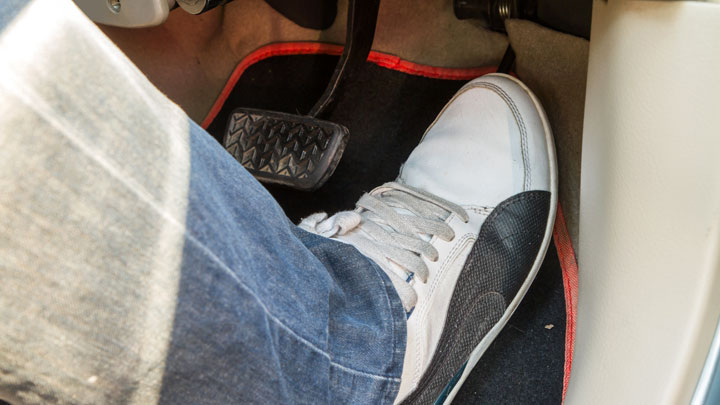
Since not enough air is getting into the engine, it’s not going to be running as efficiently as it should. A telltale sign of a dirty air filter is poor acceleration.
If it feels like your car seems slower and a bit sluggish, checking the condition of your air filter should be your first step (always check for the cheapest and easiest possible cause when diagnosing ANY automotive issue).
#3 – Check Engine Light Illuminates

Service lights are another indicator of a bad air filter. During engine combustion, your car naturally produces some carbon deposits as a byproduct.
A clogged air filter restricts airflow into the engine, which leads to inadequate air supply and too much fuel being burned. This causes excessive carbon deposits and will eventually trigger the check engine light.
To confirm, you’ll need to scan your vehicle with a diagnostic tool as a check engine light can mean hundreds of different things.
#4 – Visually Dark and Dirty Air Filter

A clean air filter usually has a white or off-white color. In the case of a reusable K&N filter, it will be more of a plum color.
As outside dirt and debris continue to accumulate on its filter surface, its color will begin to darken progressively. You can check the air filter manually to determine if it needs a replacement.
Often, simply undoing a couple clips on the air filter canister or cover will allow you to inspect it. If you’re still not sure whether it needs to be changed, remove the filter and observe it during day time or using a flashlight to see how clogged up it is. Note that the inner layers of filter paper inside the air filter may not have visible debris or dust and debris, even in bright light.
Make sure to have your mechanic check the air filter when you drop your car in for maintenance and follow the manufacturer’s instructions regarding air filter replacement. The service area of a car dealership will usually check the filter for you automatically.
Related: Why is There Oil in My Air Filter?
#5 – Reduction in Fuel Economy
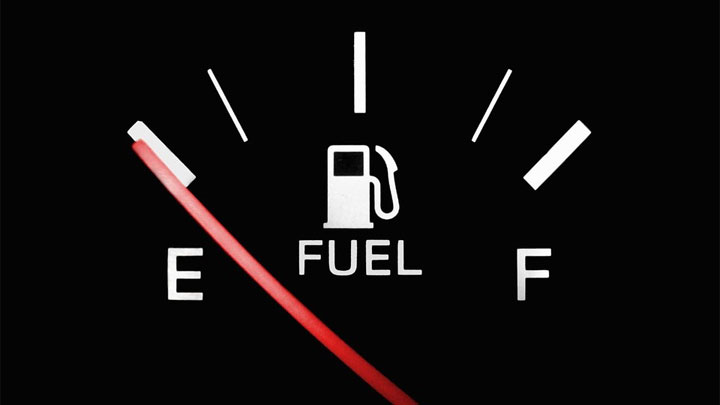
A car engine uses gasoline and air to fire up and produce power. When there is an inadequate air supply, your car engine compensates for the deficit with too much fuel (referred to as “running rich“. This condition increases fuel consumption.
That’s why a reduction in your MPG is often a clear sign that you may need to replace your air filter.
#6 – Misfiring of the engine
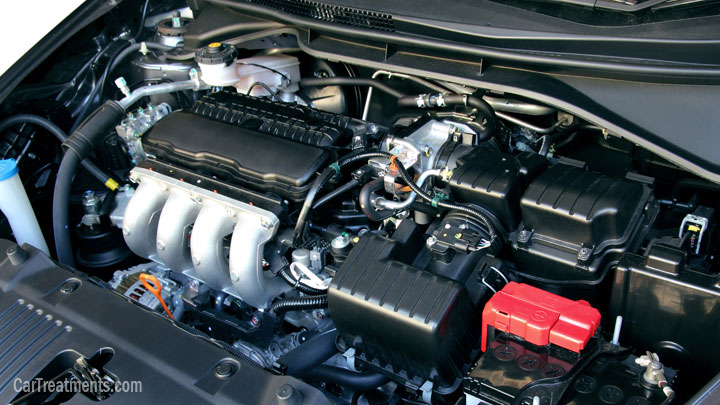
A dirty filter lowers the air supply in your car engine, resulting in unburned fuel. This fuel leads to the formation of soot residue that mounts up on the spark plug tip.
As a result, the plug is unable to deliver a proper spark for igniting the air-fuel mixture, and subsequently, your car engine misfires or fails to startup leading to your car experiencing rough jerks when idling and especially when accelerating.
#7 – Dark Smoke, Soot, or Flames Out of the Exhaust
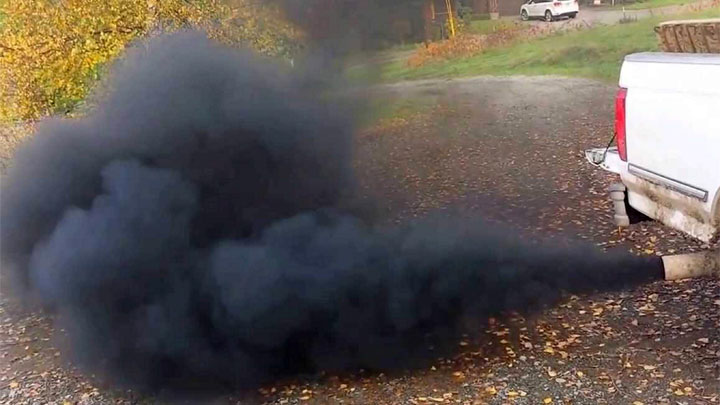
As noted above, inadequate air into the engine can cause incomplete fuel burning in the combustion chamber.
The unburned fuel leaves the engine through the exhaust, which results in dark gray or black smoke. In rare instances, you may even notice some flames shooting out of your tailpipe. These flames are due to the unburned fuel burning from the heat in the exhaust system.
#8 – Gasoline Smell During Startup
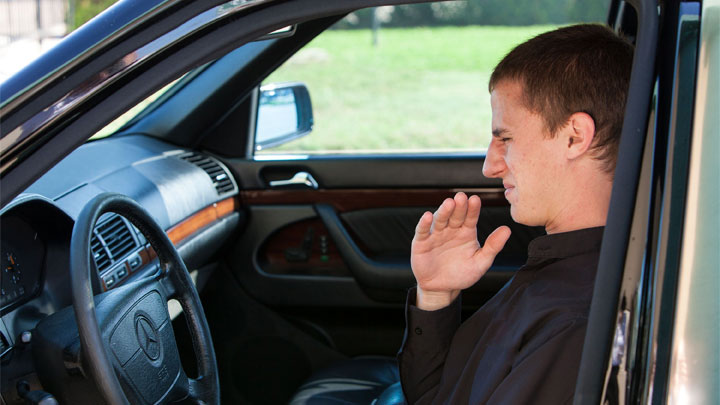
A strong gasoline smell is another sign of a very dirty air filter.
With inadequate air supply, the unburned fuel leaves the engine, and may not produce sooty smoke or flames in the process. Instead, this fuel will emit a distinct gasoline smell, a reliable indicator of a bad air filter.
Engine Air Filter Replacement Cost
Best places to order parts? See: 19 Best Online Auto Parts Stores
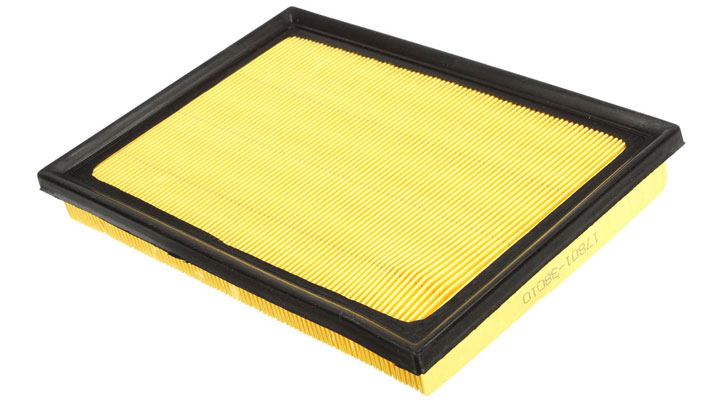
Like other car maintenance services, air filter replacement costs differ with the car model and where you seek assistance. Replacing your air filter is actually one of the easiest DIY tasks you can do on your vehicle so 95% of the population should be able to change it themselves.
On average, expect to pay between $10 and $25 for a standard paper air filter at an auto parts store. You may save a couple bucks by buying at Walmart or Amazon.
In the case of a reusable air filter, it will set you back about $45 to $80 on average, depending on the vehicle. After the first year, you will also need to purchase a cleaning kit for your reusable K&N filter. Fortunately, the cleaning kit is cheap and will last for multiple cleanings.
If you want a professional to replace the filter for you, they’re going to charge you about $20-$30 for their time in addition to the cost of the filter (which will also have a markup). With parts and labor, count on about $50 to $90 total depending on your vehicle and who you go to.
Many mechanics or dealerships will allow you to buy the filter on your own and bring it to them to do the install. This way you’ll still save some money while not getting your hands dirty.
Can You Clean or Wash an Air Filter?
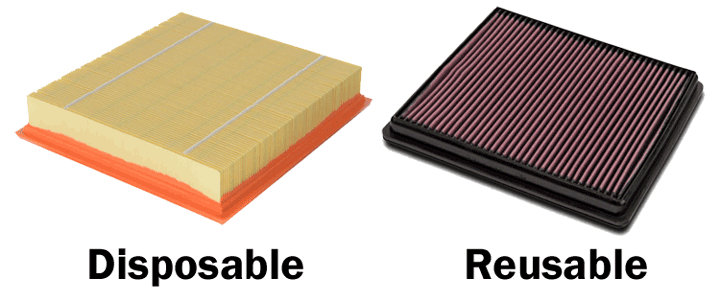
The option of cleaning or not cleaning an air filter depends on the type of air filter you’re using in your car.
Air filters come in three types:
- Disposable
- Reusable (gauze)
- Foam (rare)
You cannot clean a disposable air filter, so replacement is the only option. You can, however, clean reusable and foam filters but only with specific applications, and you must dry them before replacing them.
Putting back a wet filter into the car’s engine will adversely impact the car’s engine.
See Also: How to Clean a Cabin Air Filter
What Happens If You Run Your Car Without an Air Filter?
Running your car without an air filter allows for the entry of dirt, leaves, debris, insects, and a multitude of air contaminants.
These harmful elements cause significant damage to the internal parts of your car’s engine like pistons, valves, and cylinders. Also, the fuel and oil consumption of your engine will increase significantly, and this could lead to engine failure.
So, for the safe and optimal performance of your engine, make sure to address dirty air filter symptoms promptly and to always have a clean air filter in place.

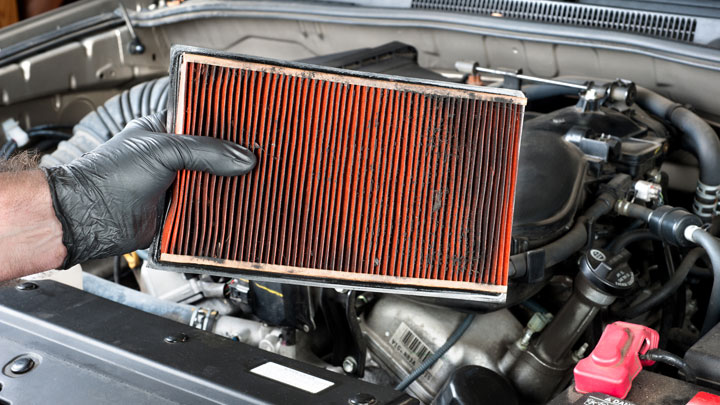
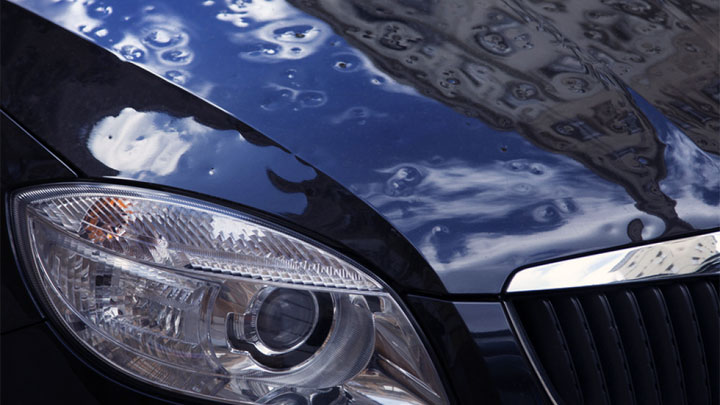

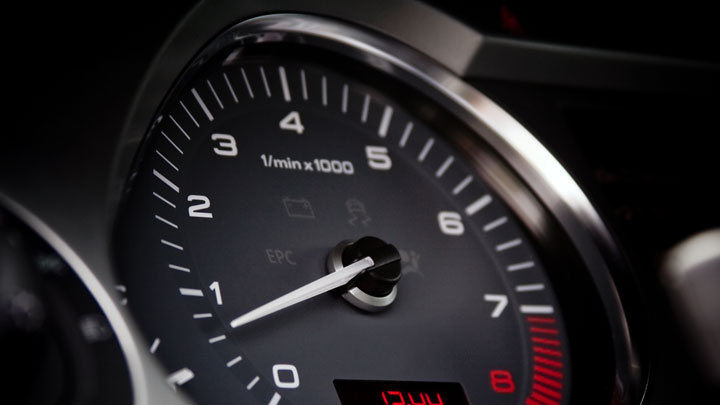
My car idle rough and engine vibrate and it’s given me alot of concerns. Mechanic have touched it and I had to stop them guessing. The reader say cylinder misfire and I’m disturbed.
Find a mechanic who will test instead of guess.